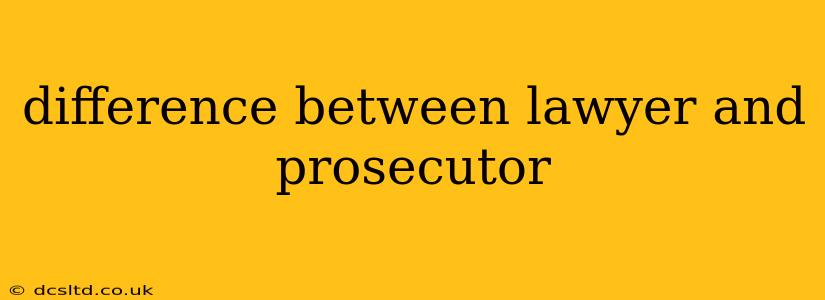The terms "lawyer" and "prosecutor" are often used interchangeably, leading to confusion. While all prosecutors are lawyers, not all lawyers are prosecutors. Understanding their distinct roles and responsibilities is crucial. This article will delve into the key differences, addressing common questions surrounding these legal professions.
What is a Lawyer?
A lawyer, also known as an attorney or solicitor (depending on the jurisdiction), is a professional who is qualified and licensed to practice law. Their role is multifaceted, encompassing a wide range of legal services. They represent clients in various legal matters, advocating for their rights and best interests. This might involve:
- Litigation: Representing clients in court, preparing legal documents, and arguing cases before a judge or jury.
- Negotiation: Reaching settlements outside of court to avoid lengthy and costly litigation.
- Legal Advice: Providing counsel on legal issues, helping clients understand their rights and obligations.
- Contract Drafting and Review: Preparing, reviewing, and negotiating contracts to protect their clients' interests.
- Estate Planning: Assisting with wills, trusts, and other estate planning documents.
- Corporate Law: Advising businesses on legal compliance and corporate governance.
Essentially, lawyers act as legal advocates for individuals and organizations, guiding them through the complexities of the legal system.
What is a Prosecutor?
A prosecutor, also known as a district attorney (DA) or state's attorney, is a lawyer employed by the government to represent the state or the people in criminal cases. Their primary responsibility is to bring charges against individuals accused of crimes and to present the case against them in court. Key aspects of their job include:
- Investigating Crimes: Working with law enforcement to investigate alleged crimes and gather evidence.
- Filing Charges: Determining whether to file criminal charges and what charges are appropriate.
- Presenting Cases in Court: Presenting evidence, questioning witnesses, and arguing the case before a judge or jury.
- Negotiating Plea Bargains: Negotiating plea agreements with defendants to avoid lengthy trials.
- Sentencing Recommendations: Recommending appropriate sentences to the judge once a conviction has been obtained.
Prosecutors work to uphold the law and ensure that justice is served. They act as representatives of the public interest, not a specific individual or organization, unlike most other lawyers.
What are the Main Differences Between a Lawyer and a Prosecutor?
The core difference lies in their client and objective. A lawyer represents a client, working to achieve the best possible outcome for that client, within the bounds of the law. A prosecutor, on the other hand, represents the state or the people, aiming to uphold the law and ensure justice is served. This difference impacts their approach to a case, their ethical obligations, and their overall responsibilities.
Here's a table summarizing the key differences:
| Feature | Lawyer | Prosecutor |
|---|---|---|
| Client | Individual, organization, or corporation | The state or the people |
| Objective | Best possible outcome for their client | Upholding the law and seeking justice |
| Role | Advocate for their client | Representative of the public interest |
| Employment | Private practice, government agency, etc. | Government agency |
| Case Handling | Can represent either side in a case | Represents only the prosecution side |
Can a Lawyer Become a Prosecutor?
Yes, many lawyers choose to become prosecutors. The transition typically involves applying for a position within a government agency's prosecuting office. A strong legal background, experience in litigation, and a commitment to public service are typically required.
What are the ethical considerations for prosecutors?
Prosecutors face a unique set of ethical considerations due to their role as representatives of the public. They are bound by ethical rules that emphasize fairness, impartiality, and a commitment to seeking justice, even if it means challenging their own office's decisions. They must avoid conflicts of interest and ensure that their actions are consistent with their ethical obligations.
What is the difference between a public defender and a prosecutor?
A public defender is a lawyer appointed by the court to represent individuals who cannot afford legal counsel in criminal cases. They act as the defense attorney, working against the prosecutor to protect their client's rights. The public defender and prosecutor are opposing parties in a criminal case, working toward opposing goals.
This article provides a comprehensive overview of the differences between lawyers and prosecutors. Remember that the specific duties and responsibilities can vary depending on the jurisdiction and the type of law practiced.
